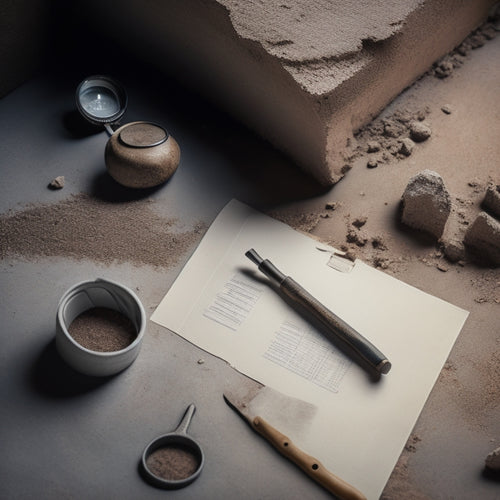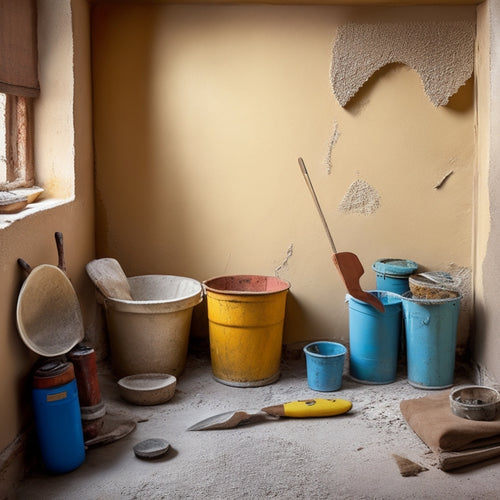
Why Accurate Tool Cost Estimation Matters in Renovation
Share
When you're planning a renovation, accurate tool cost estimation is essential to avoid unexpected expenses and project derailment. Inaccurate estimates can lead to significant delays, resource reallocation, and schedule adjustments, ultimately affecting the entire renovation timeline. By considering thorough tool costs, including rental, maintenance, and repair fees, you can create a realistic understanding of resources and prevent costly mistakes. Additionally, investing in high-quality tools enhances project efficiency, reduces waste, and promotes sustainability. By getting accurate estimates, you'll be able to make informed decisions that impact your project's success - and understanding the nuances of tool cost estimation can make all the difference in achieving your renovation goals.
Key Takeaways
• Accurate tool cost estimation prevents project derailment by avoiding unexpected expenses and ensuring a realistic understanding of resources.
• Inaccurate estimates lead to resource reallocation, schedule adjustments, and delays in subsequent tasks, affecting the entire renovation timeline.
• Comprehensive tool cost considerations, including rental, maintenance, and repair costs, create a thorough budget and prevent budget overruns.
• Investing in high-quality tools enhances project efficiency, reduces long-term costs, and promotes sustainability through reduced waste and accident risks.
• Efficient tool allocation and maintenance directly impact project budgets, minimizing waste and downtime, and maximizing resource allocation.
Tool Costs in Renovation Planning
When planning a renovation project, you must account for tool costs to confirm accurate budgeting and avoid unexpected expenses. This vital step guarantees that you allocate sufficient funds for the necessary tools and equipment.
Without a thorough tool cost estimate, you risk derailing your project timelines and exceeding your budget.
To accurately estimate tool costs, you must carefully consider your tool selection. Will you need specialized equipment for specific tasks, or can you make do with multi-purpose tools?
Make a list of all the tools required for each phase of the project, and research their costs. Be sure to factor in rental or leasing options, as well as potential maintenance and repair expenses.
Inaccurate Estimates Lead to Delays
You'll face significant project delays if you underestimate tool costs, as inaccurate estimates can lead to a ripple effect of setbacks throughout the renovation timeline. This is because tool costs are intricately tied to project timelines, and any miscalculation can have far-reaching consequences.
When you underestimate tool costs, you'll likely incur unexpected expenses, which will force you to reallocate resources and adjust your project schedule. This, in turn, will lead to delays, as tasks will take longer to complete, and dependencies will be affected.
In addition, inaccurate estimates can lead to a cascade of delays, as subsequent tasks will be pushed back, causing a ripple effect throughout the project.
To avoid this, it's crucial to accurately estimate tool costs, guaranteeing that you have a realistic understanding of the resources required to complete each task.
Budgeting for Specialized Tools
To guarantee accurate tool cost estimation, it's essential to allocate a dedicated budget for specialized tools that are vital to specific tasks in your renovation project. These tools are often high-ticket items that can't be substituted with general-purpose equipment.
By budgeting for them separately, you'll avoid underestimating their costs and make certain that your project stays on track.
When budgeting for specialized equipment, consider the tasks that require unique tools. Identify the tools you'll need and research their costs. You may need to consult with contractors or suppliers to get accurate quotes.
Be sure to factor in maintenance, repair, and replacement costs, as well as any training or certification requirements for operators.
Effective budgeting strategies for specialized tools include setting aside a contingency fund, prioritizing essential tools, and exploring rental or leasing options.
Hidden Costs of Tool Rental
When you rent tools for a renovation project, you might assume that the daily or weekly rental fee is the only cost you need to take into account.
However, you'll often find that there are additional charges that can add up quickly, such as unexpected extensions to the rental duration or equipment maintenance fees that you hadn't factored into your budget.
Rental Duration Surprises
Rental agreements often mask hidden costs, as contractors fail to account for equipment downtime, idle time, and unforeseen delays, which can extend the rental duration and inflate the total cost. You may think you've got a solid estimate, but unexpected extensions can quickly add up.
When you're renting tools, it's important to take into account the potential for rental duration surprises. You might need to keep equipment on site longer than anticipated, resulting in additional rental fees. This can happen due to:
-
Unforeseen changes to the project scope
-
Inclement weather or natural disasters that slow down progress
-
Delays in material delivery or labor availability
These unexpected extensions can blow your budget, and it's vital to incorporate them into your initial cost estimate.
Equipment Maintenance Fees
You'll likely be charged equipment maintenance fees, which can add up quickly, especially if you're renting complex machinery that requires regular servicing to prevent breakdowns. These fees are often overlooked in the initial cost analysis, but they can greatly impact your overall renovation budget. As you explore deeper into the details, you'll realize that preventive maintenance is vital to guarantee the equipment operates efficiently and safely.
Here's a breakdown of typical equipment maintenance fees:
| Equipment Type | Average Maintenance Fee (per day) |
|---|---|
| Skid-steer loader | $50-$100 |
| Telehandler | $75-$150 |
| Cranes | $100-$250 |
| Generators | $20-$50 |
| Air compressors | $10-$30 |
These fees may seem minor, but they can add up quickly, especially for long-term rentals. When conducting a cost analysis, it's important to factor in these hidden costs to get an accurate estimate of your tool rental expenses. By doing so, you'll be better equipped to manage your budget and avoid costly surprises down the line.
Quality Tools for Quality Results
When you're planning a renovation, you know that quality tools are essential for achieving quality results.
To guarantee accuracy in your tool cost estimation, you'll want to develop a solid tool investment strategy, break down material costs, and select tools efficiently.
Tool Investment Strategies
By allocating a reasonable budget for high-quality tools, renovation professionals can guarantee that their projects are completed efficiently and effectively, resulting in superior outcomes that meet clients' expectations.
This investment strategy not only enhances the quality of work but also yields a significant return on investment in the long run.
When you prioritize tool ownership, you're making a smart business decision. Here are a few benefits you can expect:
-
Reduced equipment rental costs: By owning your tools, you eliminate the need for frequent rentals, saving you money in the long run.
-
Increased productivity: High-quality tools are designed to optimize performance, allowing you to complete tasks faster and with greater accuracy.
-
Improved job site safety: Well-maintained, high-quality tools reduce the risk of accidents and injuries, creating a safer work environment.
Material Cost Breakdown
To guarantee accurate tool cost estimation, it's vital to allocate a significant portion of your budget to high-quality materials that complement your investment in premium tools, resulting in superior renovation outcomes.
You can't afford to compromise on materials, as they directly impact the quality and durability of your renovation project. A thorough material cost breakdown is important to avoid cost overruns and make certain that your project stays within budget.
When sourcing materials, it's vital to take into account factors like quality, quantity, and lead time to avoid delays and cost fluctuations. You should also research and compare prices from different suppliers to get the best deals.
A detailed material cost breakdown will help you identify areas where you can optimize costs without compromising on quality. By doing so, you'll be able to allocate your budget more effectively, minimize waste, and make certain that your renovation project meets your desired standards.
Efficient Tool Selection
Selecting the right tools for your renovation project is essential, as they directly impact the quality of your work, your productivity, and ultimately, your bottom line. You want tools that will help you achieve professional-grade results while minimizing downtime and maximizing efficiency.
When choosing tools, consider the following key factors:
-
Tool compatibility: Confirm the tools you select are compatible with each other and the materials you're working with. This will streamline your workflow and reduce the risk of errors.
-
User experience: Opt for tools with an intuitive design and user-friendly interface. This will help you get up to speed quickly and avoid frustrating delays.
-
Durability and reliability: Invest in high-quality tools that can withstand the demands of your project. This will save you money and hassle in the long run.
Reducing Waste With Accurate Estimates
You can eliminate up to 20% of construction waste by creating accurate tool cost estimates, which helps to avoid over-purchasing and reduces the likelihood of unnecessary materials ending up in landfills.
By doing so, you're not only reducing waste but also promoting waste minimization and contributing to a more sustainable construction process.
Accurate estimates enable you to purchase the right quantities of materials, reducing the risk of excess materials going to waste.
This, in turn, leads to increased project efficiency as you're able to allocate resources more effectively.
With accurate estimates, you can identify areas where materials can be optimized, reused, or recycled, reducing the environmental impact of your project.
By implementing waste reduction strategies, you'll not only reduce waste but also save resources, reduce costs, and enhance your project's reputation.
Maximizing Budget With Tool Efficiency
Efficient tool allocation and maintenance are critical components of a renovation project, as they directly impact your budget and can free up resources for more critical aspects of the project.
By optimizing your tool usage, you can reduce waste, minimize downtime, and improve overall productivity. This, in turn, allows you to allocate your budget more effectively, guaranteeing that you're getting the most value out of your resources.
To achieve this, focus on the following key areas:
-
Tool optimization: Identify the most critical tools required for your project and allocate them accordingly. Make certain that you have the right tools for the job, and that they're in good working condition.
-
Regular maintenance: Schedule regular maintenance checks to prevent tool breakdowns and reduce the risk of accidents.
-
Budget alignment: Align your tool costs with your project goals, making sure that you're allocating your budget to the most critical areas of the project.
Frequently Asked Questions
How Do I Estimate Tool Costs for Unique or Custom Renovation Projects?
When estimating tool costs for unique or custom renovation projects, you'll need to make a project-specific list of required tools.
Identify the custom tool selection necessary for the job, and research their costs.
Create a detailed breakdown of each tool's expense, including rental or purchase prices, maintenance, and potential upgrades.
This will help you develop a realistic project budget that accounts for the unique demands of your custom renovation project.
Can I Reuse Tools From a Previous Project to Reduce Costs?
Did you know that 75% of contractors regard tool costs as a significant expense in renovation projects?
When reusing tools from a previous project, you'll need to take into account tool maintenance and potential repairs to guarantee they're still functional.
If the tool is no longer reliable, explore rental options to reduce costs.
You can also weigh the benefits of renting specialized tools against purchasing new ones for the project.
Are There Any Tax Benefits to Buying Tools for a Renovation Project?
When you buy tools for a renovation project, you're likely wondering if you can reap any tax benefits. The answer is yes!
You can claim tax deductions on the tools as business expenses or depreciate them over time. Tool depreciation allows you to spread the cost over multiple years, reducing your taxable income.
Consult with a tax professional to guarantee you're taking advantage of these benefits and maximizing your savings.
How Do I Determine the Optimal Tool Replacement Cycle for My Project?
When you're revamping your space, you're not just building a dream, you're building a legacy.
Now, to guarantee your tools don't become a liability, you need to determine the ideal replacement cycle.
Conduct a tool durability analysis to identify weak links, and then perform a replacement frequency evaluation.
Can I Negotiate Tool Prices With Suppliers or Vendors?
You can definitely negotiate tool prices with suppliers or vendors, but it requires strategic planning.
Develop tool pricing strategies that align with your project's needs and budget.
Foster strong vendor relationship management by building trust, communicating openly, and being transparent about your requirements.
This will give you leverage to negotiate better prices, discounts, or even customized tool packages that meet your project's unique demands.
Conclusion
As you stand amidst the chaos of a renovation site, the weight of inaccurate tool cost estimates settles like a thick fog, obscuring your vision of a timely and budget-friendly project.
But with precise calculations, the mist clears, revealing a path to efficiency and profitability.
By grasping the importance of accurate tool cost estimation, you can unfasten a renovation that's as streamlined as a finely-tuned machine, where every dollar and minute is maximized, and the finished product shines like a beacon of excellence.
Related Posts
-

Crack Repair Inspection Checklist for Home Renovation
When creating a crack repair inspection checklist for your home renovation project, you'll want to identify crack typ...
-

Why Renovation Waste Disposal Harms the Environment
When you undertake a renovation project, you're contributing to a staggering problem: renovation waste disposal, whic...
-

Stucco Patching Material Checklist for Home Renovation
You'll need a range of essential tools, including a putty knife, wire brush, hawk or flat trowel, level, and straight...


